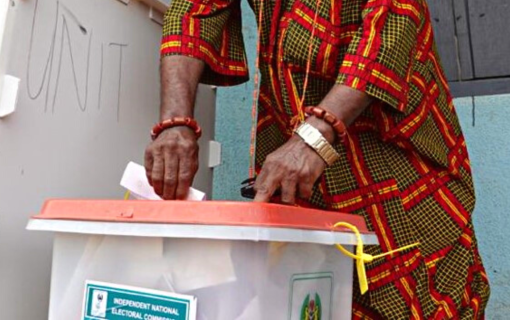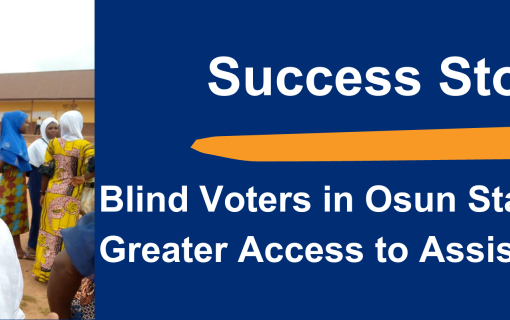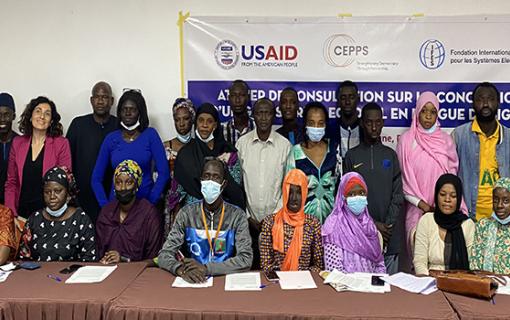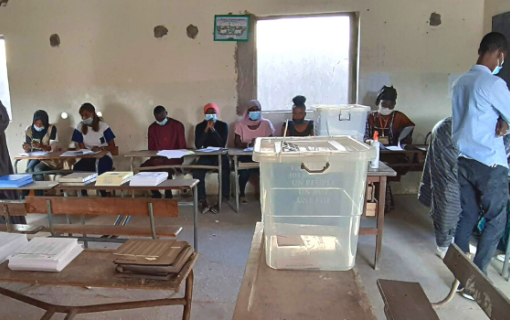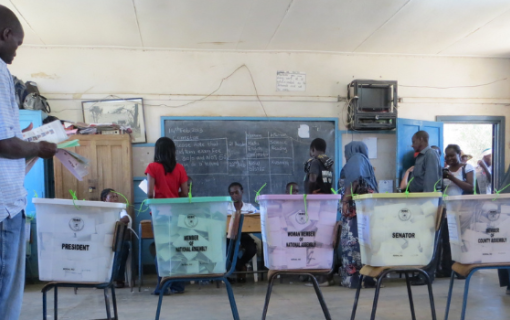Côte d’Ivoire Electoral Reform Support
Program Information
Country: Côte d’Ivoire
Project Title: “Côte d’Ivoire Electoral Reform Support”
Period of Performance: June 5, 2014 – June 30, 2018
Context
In Côte d’Ivoire, mistrust among political contestants and their supporters and alleged manipulation of electoral processes during each presidential election since the advent of multiparty politics has undermined confidence in electoral systems. This unfortunate trend culminated with the 2010 post-election violence that left 3,000 Ivoirians dead and one million displaced after former President Laurent Gbagbo refused to accept the official results released by the Independent Election Commission (Commission Electorale Indépendante [CEI]), which were certified by the United Nations. Many Ivoirians fear that without consensus on a reformed electoral framework and enhanced confidence in an impartial election administration, the upcoming 2015 presidential poll would lack legitimacy among the nearly half of the voting population that supported Laurent Gbagbo in 2010, risking a return to violence and conflict.
Ivoirians agree on the need to reform the electoral framework in several key areas, but disagree on how best to proceed. For example, while there is broad agreement on the need to restructure the election commission and to update the voter list, opinions vary widely on the ideal composition of the commission and on how to ensure an inclusive, accurate voter registration process. The government recently proposed draft legislation for restructuring the CEI without discussing the reforms with other stakeholders beforehand; civil society and opposition parties have denounced this step as unilateral and formulated a counterproposal. Meanwhile, U.N. officials have called for broader consultations on electoral reforms. Since the main opposition party boycotted the legislative elections and is not represented in parliament, reforms could be passed without any input from the opposition or other key stakeholders, which could raise tensions further. In such a highly polarized political context, independent facilitation and technical expertise are needed to inform Ivoirian discussions on electoral reform.
Lack of consensus over the last voter registration exercise, insufficient voter education and contradictory statements by domestic observation groups contributed to the post-election crisis in 2010. Independent verification of voter registration could contribute significantly to public confidence and reduce political volatility in advance of the 2015 presidential election. Civic groups that engage in systematic monitoring of voter registration and Election Day processes, using statistically based observation methods, and those that deliver voter and civic education messages for all sides to refrain from violence during elections, can successfully contribute to peaceful electoral processes. Ivoirian civil society organizations (CSOs) have expressed keen interest in developing the skills and networks to carry out these roles, and requested technical assistance on these and other election related activities. The data collected and electoral and organizational skills developed through these activities can provide leverage for CSOs to grow their influence on electoral and political process issues.
The Côte d’Ivoire program is designed to increase citizen confidence in the electoral system’s ability to deliver inclusive, peaceful and credible elections. It is composed of the following objectives:
- Objective 1: Support reform of the electoral framework to promote peaceful elections and better reflect international standards.
- Objective 2: Increase citizens’ awareness of their rights and responsibilities in a democratic state and improve their participation in, and oversight of, the electoral process.
These objectives will be met through a series of complementary program activities to be conducted by IFES, the National Democratic Institute (NDI) and Ivorian CSOs. NDI will convene an Electoral Reform Contact Group (ERCG) or similar forum for dialogue, to provide open channels of communication between key constituencies during the electoral reform process. This will facilitate a process that would allow input from stakeholders, including those not represented in the National Assembly, on reform proposals. IFES will conduct a review of the legal and regulatory framework and provide technical expertise to the ERCG, while NDI will assist the National Assembly to undertake an inclusive, issue-based examination of proposed reforms. Electoral reform legislation would thus benefit from an inclusive process and international expertise.
IFES will accompany the CEI through the presidential and legislative elections to assist the CEI to become a more, professional, capable and credible body, and ensure that its roles and responsibilities are clearly communicated to and understood by stakeholders. To do so, IFES will provide targeted day-to-day technical assistance and relevant capacity-building workshops and training exercises that address the CEI’s core functions and remedy deficiencies.
IFES will lead a coordinated approach with NDI to increase citizens’ awareness of their rights and responsibilities, building on the findings of a Conflict Sensitivity Assessment that will be conducted. In addition, through a series of focus groups, IFES will ensure that evidence-based approaches are used for civic education activities to enhance voter registration and mobilization, with certain activities emphasizing marginalized populations, while NDI will conduct peaceful elections messaging nationwide through radio messages, tailoring messages to conflict-prone communities, to be delivered through community-based organizations.
IFES Technical Assistance
Over the course of the program, IFES will implement the following activities:
- An expert assessment of the legal and regulatory framework governing elections: IFES will conduct an in-depth assessment of the Ivoirian electoral code and other governing texts that make up the legal and regulatory framework that will ultimately shape the 2015/2016 elections, and the final composition and structure of the CEI. The second stage of the assessment will be an in-country mission for interviews with relevant bodies, ministries and stakeholders to assess electoral procedures and operational regulations that will cover areas such as: voter registration, boundary delimitation, framing of the electoral campaign, political finance regulations, framing for the management of electoral disputes, and provisions for the compilation and publication of results.
- A strategic planning exercise for the CEI: IFES will build on its day-to-day engagement with the CEI and deploy a Strategic Planning Specialist who will be able to help the CEI map out the milestones and anticipated timelines over the next five years. The exercise’s deliverable will be an integrated strategic plan that will ensure coordination and consistency between the various operational aspects of the electoral cycle.
- An electoral fraud and malpractice control planning exercise: IFES will support the CEI’s efforts to deter, detect and mitigate key vulnerabilities to electoral fraud by assisting the CEI in developing a control plan targeting the electoral integrity risks identified during the strategic planning exercise. IFES will conduct trainings that will focus on gaining CEI ownership of and investment in the control plan process, and will seek to impute a comprehensive understanding of the necessary steps to monitor implementation and follow-up.
- Capacity-building training on voter registration and voter list revision: IFES will conduct a series of trainings on the technical aspects of voter list revision and voter registration for the benefit of the CEI and other relevant institutions. The training will be led by a Voter Registration Specialist, who will provide targeted recommendations on procedural enhancements to the registration exercises based on best practices.
- Develop a communication strategy for the CEI: IFES will conduct a workshop in order to assist the CEI in designing an effective communication strategy whereby it can communicate important information relating to elections and voting to the public but also relevant administration and technical information to political parties, observers, government institutions, and civil society groups.
- Provide technical assistance and capacity-building to the CEI on a strategy for civic and voter education: IFES will support the CEI’s efforts to design an effective strategy for civic and voter education, with a particular view towards building in-house capacity in this area. IFES will also assist the CEI in developing a mapping of voter education efforts implemented by national and international partners across Côte d’Ivoire, to mitigate duplication risks and to reinforce stakeholder coordination, ensuring greater dissemination of information to citizens.
- Conduct a conflict sensitivity analysis: IFES will conduct a rapid conflict sensitivity analysis in order to better understand the actors, causes, history, dynamics, and direction of conflict in Côte d’Ivoire – especially in the realm of political dialogue and the holding of national-level elections in 2015 and 2016. The analysis will serve as a means to inform programmatic recommendations and decisions by clearly laying out potential political scenarios, risks and opportunities for both the program implementers and the various Ivoirian stakeholders involved in political processes and elections.
- Implement a Voter Opinion and Involvement through Civic Education (VOICE) campaign: IFES will implement a voter education campaign based on the VOICE methodology that will raise the electorate’s awareness on civic duty and rights, voter registration, and the importance of participating in elections, using innovative civic education outreach and “get out the vote” activities. Tools may include image box tool kits, motorized caravans, street theater, leaflet distribution, etc.
- Focus groups to inform IFES and NDI’s civic education efforts: IFES will conduct a series of focus groups throughout the country in an effort to better understand best approaches to civic education in Côte d’Ivoire.




